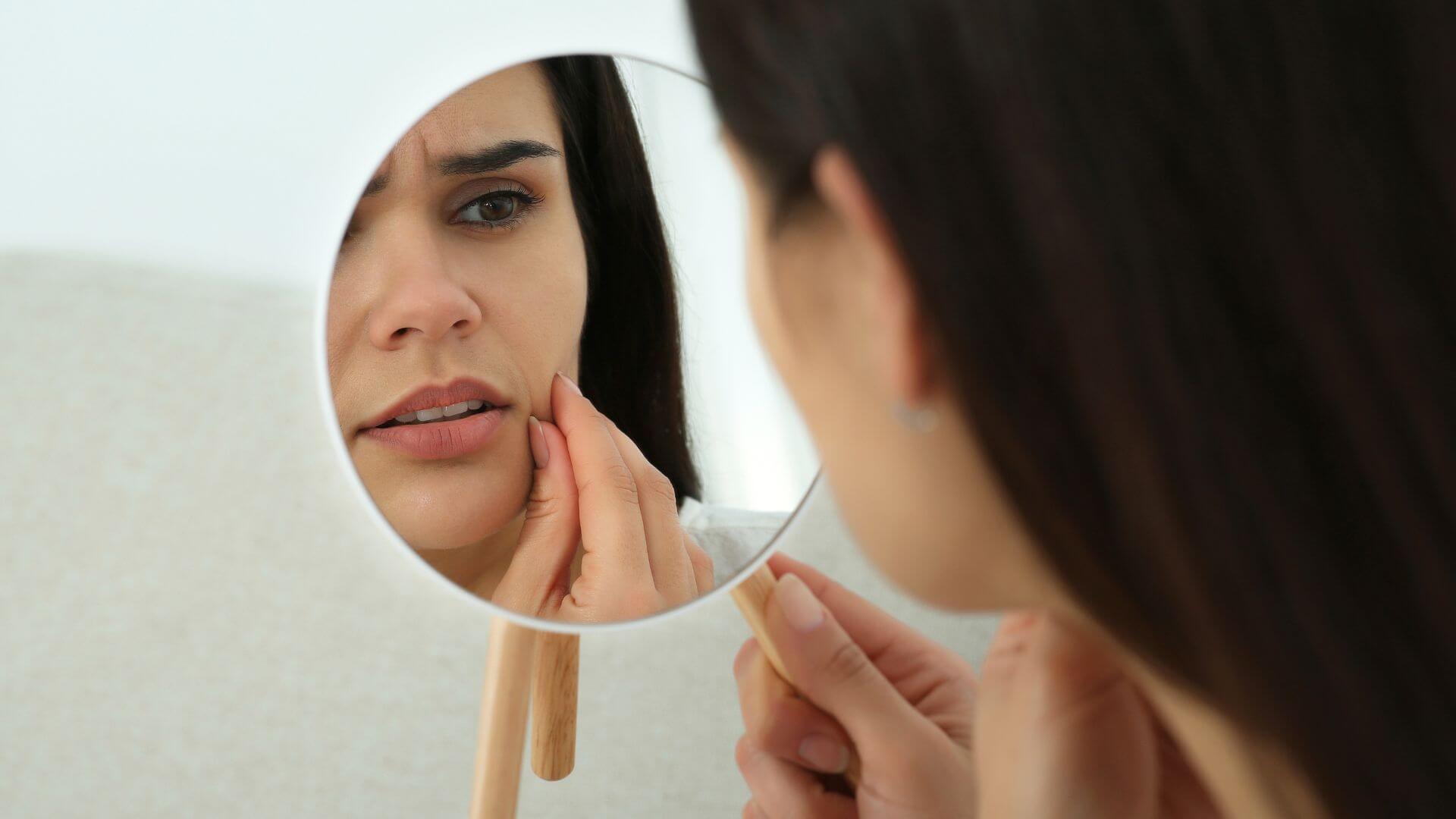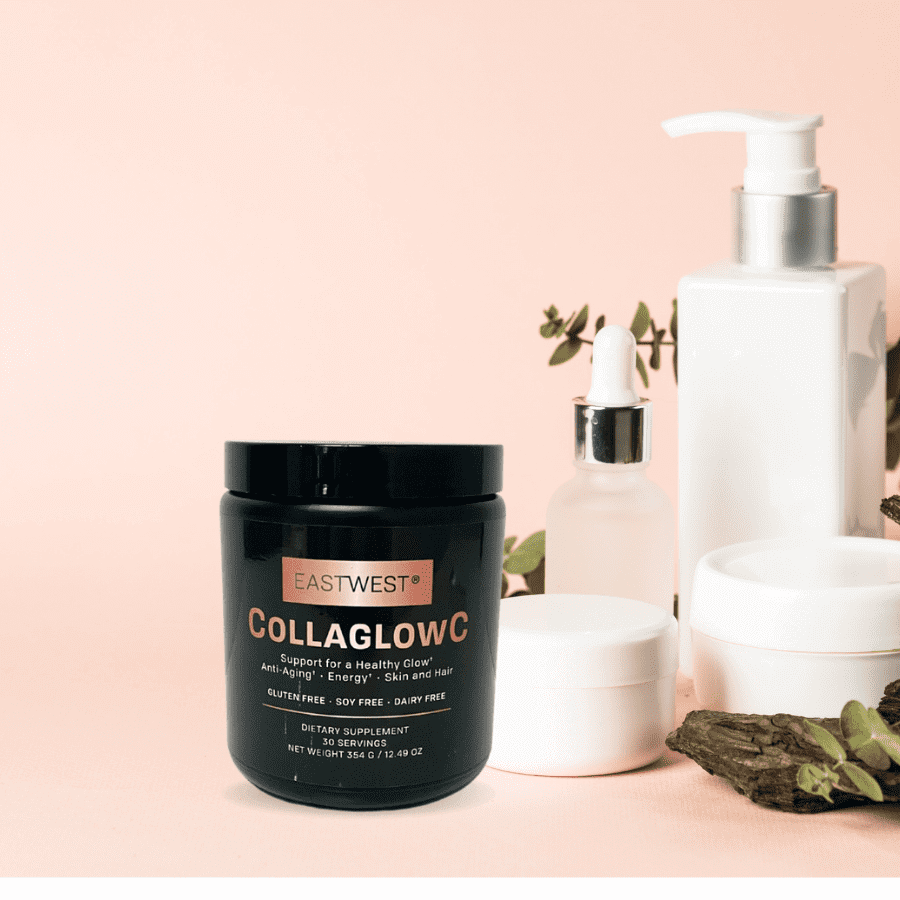Menopause, the natural biological process marking the end of a woman’s reproductive years, is associated with a multitude of changes in the body. While hot flashes, mood swings, and changes in menstrual patterns are well-known symptoms, one aspect that often catches women by surprise is menopausal acne. Yes, you read that correctly: acne can make a comeback during this stage of life.
In an effort to help you deal with this uninvited guest, let’s delve into some of the common skin changes women experience during perimenopause and menopause, explore why acne can occur, and discuss effective strategies for treating hormonal acne during this transitional period.
Common skin changes during perimenopause and menopause
There’s no fighting it: skin definitely undergoes changes during menopause. The biggest catalyst for new wrinkles and thinning skin, comes from a nearly 30% collagen loss during the five 5 years of menopause. After that, skin loses about 2% of its collagen per year (1).
Protective aspects of your skin’s barrier function also decline, which means menopausal skin loses more water, becomes drier, and more prone to redness & irritation. The hyaluronic acid content of skin cells also declines with menopause, decreasing the moisture-holding capacity of cells (2).
Menopause also reduces antioxidant capacity in the skin, making it more susceptible to oxidative damage caused by free radicals.
All this dryness, irritation, and changes to your skin barrier can cause the resurgence of acne. Even if you haven’t had acne since your teenage years, hormonal shifts during menopause can lead to breakouts.
Related: How to Repair Your Skin’s Moisture Barrier
Why does menopausal acne occur?
The primary culprit behind menopausal acne is hormonal fluctuations. Estrogen and progesterone, the two main female hormones, play a crucial role in maintaining skin health. As these hormone levels change a lot during perimenopause and menopause—so too does your skin!
When these hormones decline during menopause, testosterone, a male sex hormone present in smaller amounts in women, can become more dominant. Elevated testosterone levels can lead to increased sebum production in the skin, clogging pores with dead skin cells and oil, which only serves to worsen acne in menopausal skin.
A decline in estrogen levels can be particularly problematic for your skin

This hormone plays a significant role in keeping the skin moist, supple, and wrinkle-free. During menopause, estrogen levels decline, causing the skin to become thinner, drier, and more prone to breakouts. Decreasing estrogen also causes changes in the skin microbiome (3) (yep, just like the one in your gut, your skin has its own beneficial bacteria too!)
The imbalanced hormones also affect the skin’s ability to repair itself, making it harder for the skin to recover from acne breakouts. Some of this is due to compromised skin barrier function. Your skin’s moisture barrier is essential to protect from hydration loss and defend against environmental pollutants, irritants, allergens, microbes, and more. Unfortunately, changes in the skin structure during menopause can compromise the out layer of the skin, giving rise to more acne prone skin.
Because of this, effectively treating menopausal acne requires a much different approach than what many women are used to.
Related: Holistic Skin Care Guide: Diet, Detox, & EastWest Tips
How to treat hormonal acne during perimenopause and menopause:
So, what can you do if you’re struggling to treat menopausal acne? First, it’s essential to understand that you’ll likely need a different approach than the one you relied on as a teen to fight breakouts. The underlying cause of menopause acne is different—and so should be your approach!
Here are some tips to help alleviate menopausal acne:
Use probiotics
Adding probiotics to your diet can help balance the gut microbiome, and the collection of friendly microbes on your skin’s surface.
Restore collagen loss
Since collagen loss is accelerated during menopause, it’s a good idea to look for skin care products that help improve the synthesis of this essential protein. Ingredients like vitamin C, retinol, and peptides have all been shown to help re-establish collagen production in mature skin.
Shop: Save 40% off the Beauty Box!
Fight inflammation
A key factor in combating menopause acne is addressing inflammation. Natural antioxidants such as green tea, vitamin C, and chamomile can help reduce inflammation associated with breakouts.
Strengthen your skin barrier function
Irritated or dry skin is often a sign of compromised moisture barrier function. The basics of repairing a compromised skin barrier: skip the harsh scrubs & exfoliators, and make sure you’re using the right moisturizing ingredients.
How to: Repair Your Moisture Barrier
Eat clean
Your diet plays a vital role in maintaining healthy skin. Swap sugary, processed foods for nutrient-dense fruits and vegetables, whole grains, lean proteins, and healthy fats.
Skip harsh exfoliators
If you experience menopausal acne, it’s tempting to go straight for a heavy-duty exfoliator to scrub away impurities, but this can worsen acne for menopausal women. Exfoliate with gentle acids, buffered with additional hydrating ingredients. Abrasive exfoliators designed to get rid of dead skin cells can irritate your skin and may only worsen acne. Some more gentle exfoliators are things like lactic acid, or alpha-hydroxy acids.
Consider hormonal therapy
Work with a provider with experience in treating women’s hormones with a holistic approach. They may suggest bio-identical hormone replacement therapy, or a similar treatment.
Finally, be patient. Hormonal acne can be stubborn, and treatments may take time to work. Consistent use of recommended treatments can eventually clear up acne.
Menopause can be an emotionally trying time for many women. Skin changes can be an unwelcome added stressor. Knowing what to expect and how to handle changes in your skin can help you gain control of your health and embrace every phase of life with confidence. With the above tips, you can say goodbye to menopausal acne and enjoy clear, healthy-looking skin after making these changes to your skincare routine.
Resources



